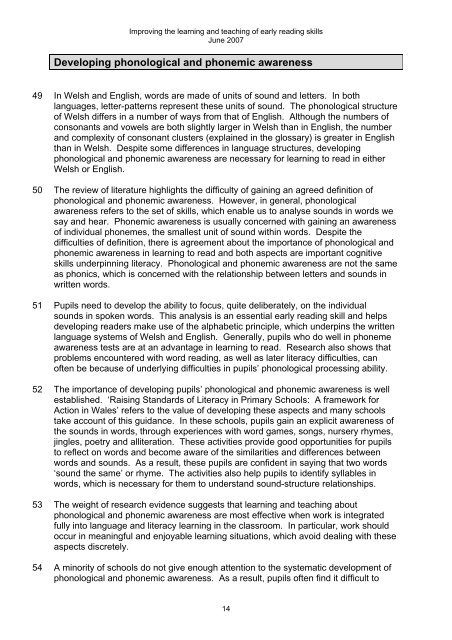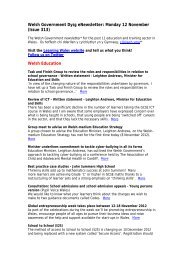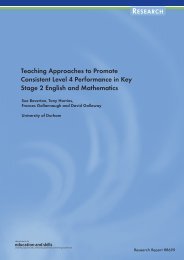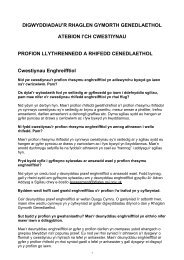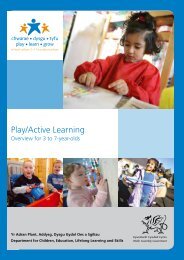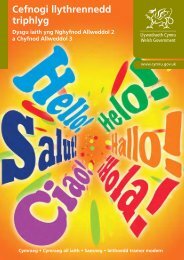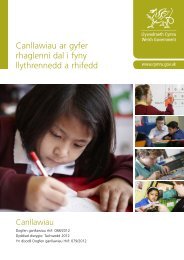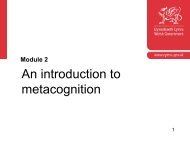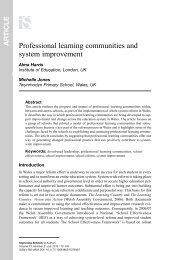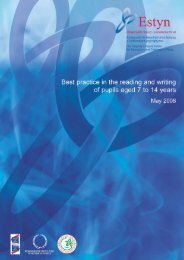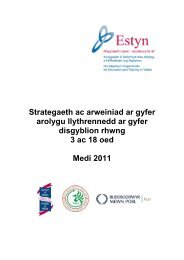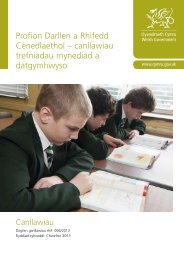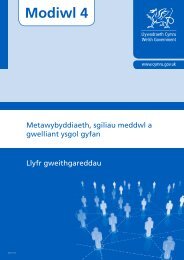Improving the learning and teaching of early reading skills - Estyn
Improving the learning and teaching of early reading skills - Estyn
Improving the learning and teaching of early reading skills - Estyn
You also want an ePaper? Increase the reach of your titles
YUMPU automatically turns print PDFs into web optimized ePapers that Google loves.
<strong>Improving</strong> <strong>the</strong> <strong>learning</strong> <strong>and</strong> <strong>teaching</strong> <strong>of</strong> <strong>early</strong> <strong>reading</strong> <strong>skills</strong><br />
June 2007<br />
Developing phonological <strong>and</strong> phonemic awareness<br />
49 In Welsh <strong>and</strong> English, words are made <strong>of</strong> units <strong>of</strong> sound <strong>and</strong> letters. In both<br />
languages, letter-patterns represent <strong>the</strong>se units <strong>of</strong> sound. The phonological structure<br />
<strong>of</strong> Welsh differs in a number <strong>of</strong> ways from that <strong>of</strong> English. Although <strong>the</strong> numbers <strong>of</strong><br />
consonants <strong>and</strong> vowels are both slightly larger in Welsh than in English, <strong>the</strong> number<br />
<strong>and</strong> complexity <strong>of</strong> consonant clusters (explained in <strong>the</strong> glossary) is greater in English<br />
than in Welsh. Despite some differences in language structures, developing<br />
phonological <strong>and</strong> phonemic awareness are necessary for <strong>learning</strong> to read in ei<strong>the</strong>r<br />
Welsh or English.<br />
50 The review <strong>of</strong> literature highlights <strong>the</strong> difficulty <strong>of</strong> gaining an agreed definition <strong>of</strong><br />
phonological <strong>and</strong> phonemic awareness. However, in general, phonological<br />
awareness refers to <strong>the</strong> set <strong>of</strong> <strong>skills</strong>, which enable us to analyse sounds in words we<br />
say <strong>and</strong> hear. Phonemic awareness is usually concerned with gaining an awareness<br />
<strong>of</strong> individual phonemes, <strong>the</strong> smallest unit <strong>of</strong> sound within words. Despite <strong>the</strong><br />
difficulties <strong>of</strong> definition, <strong>the</strong>re is agreement about <strong>the</strong> importance <strong>of</strong> phonological <strong>and</strong><br />
phonemic awareness in <strong>learning</strong> to read <strong>and</strong> both aspects are important cognitive<br />
<strong>skills</strong> underpinning literacy. Phonological <strong>and</strong> phonemic awareness are not <strong>the</strong> same<br />
as phonics, which is concerned with <strong>the</strong> relationship between letters <strong>and</strong> sounds in<br />
written words.<br />
51 Pupils need to develop <strong>the</strong> ability to focus, quite deliberately, on <strong>the</strong> individual<br />
sounds in spoken words. This analysis is an essential <strong>early</strong> <strong>reading</strong> skill <strong>and</strong> helps<br />
developing readers make use <strong>of</strong> <strong>the</strong> alphabetic principle, which underpins <strong>the</strong> written<br />
language systems <strong>of</strong> Welsh <strong>and</strong> English. Generally, pupils who do well in phoneme<br />
awareness tests are at an advantage in <strong>learning</strong> to read. Research also shows that<br />
problems encountered with word <strong>reading</strong>, as well as later literacy difficulties, can<br />
<strong>of</strong>ten be because <strong>of</strong> underlying difficulties in pupils’ phonological processing ability.<br />
52 The importance <strong>of</strong> developing pupils’ phonological <strong>and</strong> phonemic awareness is well<br />
established. ‘Raising St<strong>and</strong>ards <strong>of</strong> Literacy in Primary Schools: A framework for<br />
Action in Wales’ refers to <strong>the</strong> value <strong>of</strong> developing <strong>the</strong>se aspects <strong>and</strong> many schools<br />
take account <strong>of</strong> this guidance. In <strong>the</strong>se schools, pupils gain an explicit awareness <strong>of</strong><br />
<strong>the</strong> sounds in words, through experiences with word games, songs, nursery rhymes,<br />
jingles, poetry <strong>and</strong> alliteration. These activities provide good opportunities for pupils<br />
to reflect on words <strong>and</strong> become aware <strong>of</strong> <strong>the</strong> similarities <strong>and</strong> differences between<br />
words <strong>and</strong> sounds. As a result, <strong>the</strong>se pupils are confident in saying that two words<br />
‘sound <strong>the</strong> same’ or rhyme. The activities also help pupils to identify syllables in<br />
words, which is necessary for <strong>the</strong>m to underst<strong>and</strong> sound-structure relationships.<br />
53 The weight <strong>of</strong> research evidence suggests that <strong>learning</strong> <strong>and</strong> <strong>teaching</strong> about<br />
phonological <strong>and</strong> phonemic awareness are most effective when work is integrated<br />
fully into language <strong>and</strong> literacy <strong>learning</strong> in <strong>the</strong> classroom. In particular, work should<br />
occur in meaningful <strong>and</strong> enjoyable <strong>learning</strong> situations, which avoid dealing with <strong>the</strong>se<br />
aspects discretely.<br />
54 A minority <strong>of</strong> schools do not give enough attention to <strong>the</strong> systematic development <strong>of</strong><br />
phonological <strong>and</strong> phonemic awareness. As a result, pupils <strong>of</strong>ten find it difficult to<br />
14


